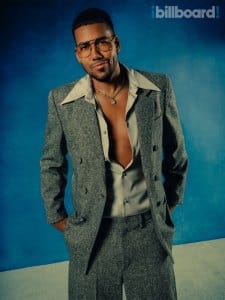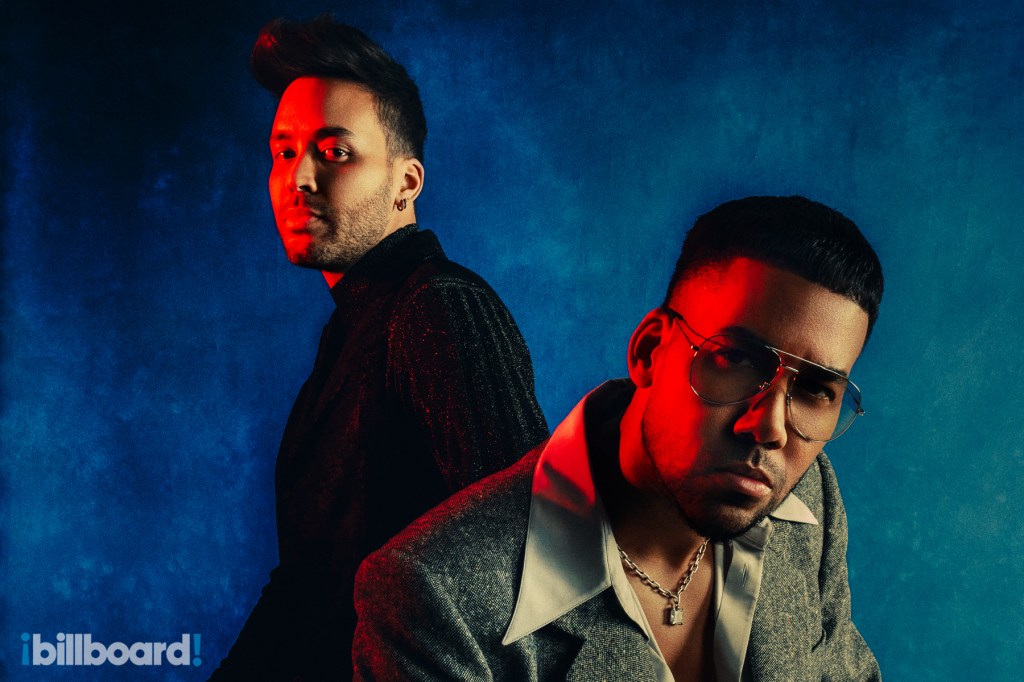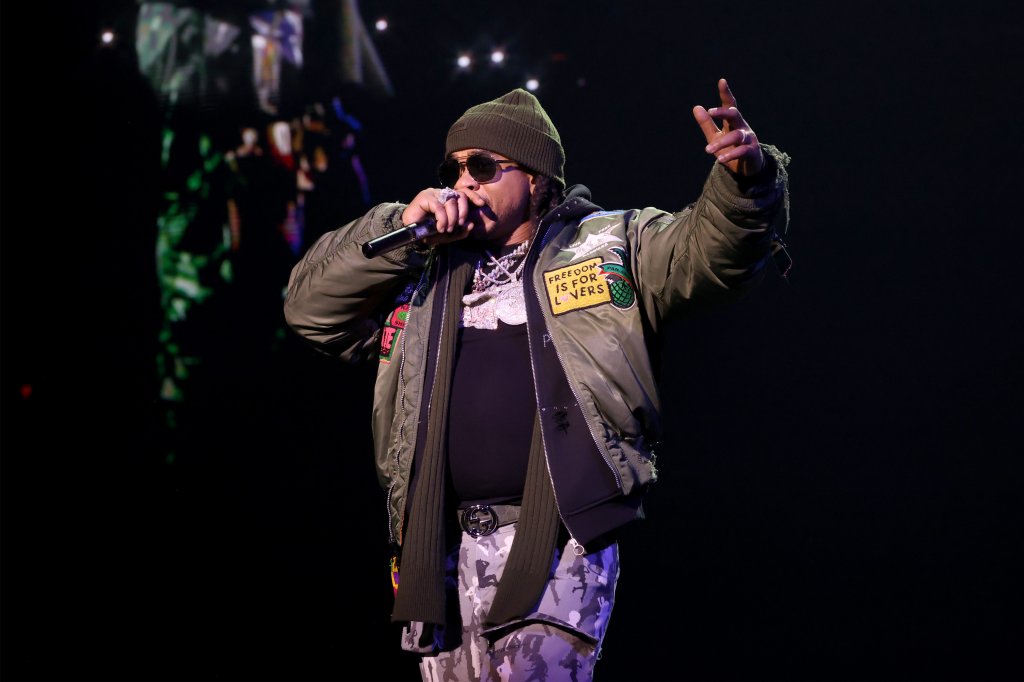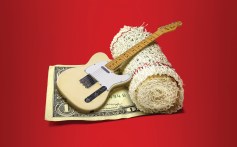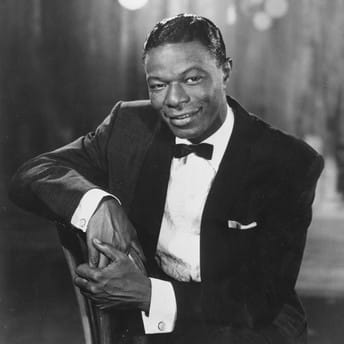News
Page: 31
Trending on Billboard
Romeo Santos arrives wearing a face mask and a hoodie. He’s not sick, just determined to avoid being recognized as he enters our New York studios, and immediately heads to his dressing room with his small entourage. Minutes later, Prince Royce walks through the door, just as quickly and discreetly, with a cap under the hood of his sweater covering half his face.
The two have been seen together in the past, but only as friends on social media. Today, the last Wednesday of October, they’re here to announce something completely different: Romeo Santos and Prince Royce, the “king” and “prince” of bachata, respectively, are finally collaborating, not on a single song, but on an entire album.
Their collaboration has been the best-kept secret in Latin music in years. Appropriately titled Better Late Than Never, the 13-song album will arrive Nov. 28 on Sony Music Latin, where only a small group of people knew of its existence.
Close friends and family were also unaware. (Coincidentally, Royce’s brother, who works as a photographer in New York, only learned of the project when he joined the team that shot the cover for this Billboard Español story and saw both artists’ names on the call sheet.) Many of the musicians who played on the album think it’s by one or the other, since both artists deliberately summoned their sidemen separately and were never seen together in the studio.
The result is pure synergy: “There’s no one taking center stage here,” Santos says. “There isn’t a song where he sings more than me or me more than him.”
I listened to the album the day before, when Santos — as he’s done in the past with Billboard — picked me up in a Cadillac Escalade V and played it for me from beginning to end, responding to my questions and reactions with the joy of someone who knows he has something special in his hands. He’s never been one to share files of his work through email before their release, and he certainly wasn’t going to risk it this time.
Better Late Than Never has the essence of Santos and Royce throughout but also offers something fresh for both artists. There are classic bachatas, more modern takes and mostly romantic lyrics, and the fusion of their recognizable voices is captivating from the first track, which shares the album’s title.
Songs such as “Dardos” and “Jezebel” stand out, the latter displaying strong R&B influences, as well as “Ay San Miguel,” a Dominican palo, and “Menor,” a surprising first collaboration for Santos with an emerging talent, Dalvin La Melodía — who also hadn’t yet been informed about Royce’s participation.
Santos and Royce wrote four of the songs together, starting with “Mi Plan,” penned during a friends trip to St. Barts in 2023, and “Better Late Than Never,” “Jezabel” and “Loquita Por Mí.” The rest were mostly written by Santos, always with Royce’s participation and honest input. But the seed of this production has been germinating since at least 2017, when they recorded the first of three failed attempts that will likely never see the light of day.
“I don’t want to sound cliché or overly religious, but God’s timing is perfect,” Santos says, explaining why now was the right time. “When we started recording the first song seven years ago, there was a little resistance from both of us. I felt convinced at the time… the vibe was there, but then we started evaluating it and [realized], ‘Mmm, this is not the song.’”
“There was a moment where I said, ‘Man, are we ever going to find that fusion, that muse, where we both feel comfortable and can say, ‘This is great?’ ” Royce adds. “And it wasn’t that I doubted it, but it required going in and really delving into it — and suddenly there was a switch.”
Santos
Malike Sidibe
The launch strategy was equally secretly planned. On Oct. 31, Halloween, Santos, unrecognizable in an Ace Ventura costume, announced on his Instagram account “new album November 28” — with a link in his bio to preorder it — along with a video of him partying in New York with an album in his hands. Days later, on Nov. 10, a massive listening party for his fans scheduled for Nov. 26 at Madison Square Garden was announced on Univision shows such as Despierta América and El Gordo y La Flaca and radio station WXNY-FM (La X 96.3) New York, where listeners could call in to win tickets. According to Santos’ publicist, at the time of the announcement, 7,000 people were online looking for tickets, all assuming that “it’s a [solo] Romeo album.”
Of course, there were no singles or previews. A music video featuring two songs — “Estocolmo” and “Dardos” — will be released simultaneously with the album. To communicate with the director, they used the code names “Batman” and “Robin.”
The collaboration between the two powerhouses is highly anticipated by bachata fans, and the fact that the project wasn’t rushed gives it new urgency and importance. Superstars of the genre from different generations, they are also very different in style — Santos with his sweet, high-pitched voice and use of traditional guitars; Royce with his light lyric tenor and a more pop/urban sound. And both have redefined the genre. Santos, 44, revived bachata when it was considered traditional regional music, giving it a sensual twist with touches of contemporary New York that captivated a new generation. Royce, 36, came later with bachata versions of Motown classics.
Santos rose to fame in the mid-1990s as leader of the group Aventura before launching a brilliant solo career in 2011 with Fórmula, Vol. 1, the longest-running bachata album by a solo artist on Billboard’s Top Latin Albums chart (17 weeks at No. 1); more recently, he was No. 2 on the Top Latin Artists of the 21st Century list (behind only Bad Bunny). Royce debuted in 2010 with a self-titled set that reached No. 1 on Top Latin Albums, which he has topped five times.
Both born in the Bronx to Dominican parents (except for Santos’ mother, who is Puerto Rican), they met at a family party. “Aventura was huge at the time,” Royce recalls. “I was in my room playing PlayStation. I heard the revolú [commotion], so many people outside. I went out and took a picture [with him],” adding that he was starstruck by the singer’s presence. Now, “This is a full-circle moment. What Romeo and Aventura have done has inspired me.”
“Romeo Santos and Prince Royce are two wonderful artists, two exceptional professionals — and even better human beings — who have dedicated their careers to bringing bachata to the world,” Afo Verde, chairman/CEO of Sony Music Latin Iberia, told me days after the interview. “Each of the songs on this brilliant album reflects the talent, creativity, passion and dedication of both of them. We can’t wait for all the fans to experience this magical album they’ve created together.”
Sitting down to talk for the first time about their most closely guarded secret in an exclusive interview with Billboard Español, Santos and Royce delve into the project, their friendship and the future of the genre that made them famous.
Prince Royce
Malike Sidibe
To begin, who approached whom? Who said, “Let’s do it”?
Romeo Santos: I’d like to take credit, but the truth is, the first person to mention the idea of recording not one, not two, but a whole album, was this gentleman right here. (Gestures to Royce.) And that was literally seven years ago, right?
Prince Royce: A long time ago, yes. I felt a lot of pressure from the public, really. If we make a song, what will it be? It can have pop elements, it can have very traditional elements, it can be a fusion. And I was thinking about how to fuse these two worlds, which, although it’s bachata, are two different styles of bachata. I always thought, “Man, how iconic would it be if we made an album, if we could give everyone these different kinds of flavors and colors?”
Santos: Yes, because that’s a valid point. When he says “the pressure,” it’s like a song will have an audience who will say, “I like this one,” but there will be another type of fan who will say, “Yes, but it’s too slow.” There are those who say, “Yes, but it’s too fast.” “Yes, but it doesn’t have that bitterness or it’s too depressing.” We have a production that fills all the gaps.
You recorded three previous tracks — one in 2017 for Golden, another in 2022 for Fórmula, Vol. 3 and a third later — and none of them were released. After three attempts, what motivated you to keep trying and not give up?
Santos: I think we started evaluating the three songs we had already recorded. “Where was the problem? How could the chorus of these three songs be improved? Was it the verse, the arrangement?” And at least I had the goal of making the songs feel organic, not like we took a song, sent a verse to Royce or vice versa, just to say we collaborated. I think it had to happen this way: three failed attempts to lead to this production. I don’t think I could have worked with Royce in a more ideal way. The best songs we were able to create are on this album.
Royce: I think for me it was, “We shouldn’t rush things.” Nowadays a lot of people lack patience, and I’ve always been very patient. I’m not a quitter, and he’s definitely not a quitter.
Santos: And you know what I respect? He was honest with me about those three songs. I mean, if he had been a hypocrite and told me, “They’re great,” this project wouldn’t have happened. But he was like, “I don’t know, loco, they’re OK, but do you think so?” So I kind of analyzed them. And honestly, every time I presented him with a song, I felt it was better than the last one.
How is it possible that none of this leaked in all these years?
Santos: Well, I’ll just say that in the world of privacy, I’m an expert. I feel very comfortable, even if it’s a little stressful, working on projects with the element of surprise. I’m used to it; I don’t like to prepare people.
Royce: In my case, I just don’t want to jinx it either. I know how he works, I’ve known him for many years. For me it was such an important project that I wanted the element of surprise, I wanted to surprise the audience, I wanted to focus on the project without anyone interfering and simply work.
Santos: Another factor was that we genuinely posted photos and videos together because we were hanging out. I think that when people saw those pictures and didn’t hear any music, they kind of overlooked it. And I didn’t know at the time that this was also what would work as a strategy for us. We managed to keep it a secret for several reasons. Also because technology has changed so radically these days that you can record a production, an album, whatever at home. We didn’t go to public studios; everything was recorded during vacations — we were in a villa with our friends and family, in my home studio in New York. We visited his house many times. That part was easy, honestly.
Royce (left) and Santos
Malike Sidibe
Tell me about “Batman” and “Robin.”
Santos: Ah, that was the code.
Royce: I called it the “Bora Project” with my small team.
Santos: We created this “Batman” and “Robin” thing, but for different aspects; for filming music videos, talking to the director: “Remember, Royce is Robin, I’m Batman.” Until it became second nature. Now I say to him: “What’s up, Robin?”
The fact that the record label hasn’t even heard the album speaks volumes about the creative freedom the label has given you to work together.
Santos: Look, I’m very grateful to Afo [Verde], to the whole Sony team really, but Afo is one of those people who respects the creative side of artists. And I remember sending Afo a message about two months ago, more or less, saying, “Brother, I have a project that I think is going to excite you. You’re going to love it, and I want to share this project with you. I want you to listen to it, to be one of the first.” Afo tells me, “I knew you were planning something,” because my last post was, if I’m not mistaken, on Jan. 8 of this year, and I’ve been ghosting on social media.
How easy or difficult was it working together as two big artists with such distinctive styles?
Royce: From the moment we made that first song [that actually worked], everything flowed for me. It was like there was a whole year where I felt like we were creating something incredible. I was so happy. And I really admire how he pushed me in the studio.
Santos: Thank you. I’m kind of a maniac.
Royce: I hadn’t felt like that in a long time. The fact that I thought I was doing well and [he’d tell me], “No, you can do better, bro,” and just keep at it…
Santos: And vice versa, because I’m so used to directing myself that sometimes you overlook certain things you stop doing as a performer. … The interesting thing about this project is that it has his essence, my essence, but musical proposals that neither of us has offered to the fans before.
Who was more involved in the production?
Santos: I would say I was… [But] I reiterate: He was very key because he trusted me, but also kind of challenged me. When I showed him a song, he was very honest, as he’s always been. So I went in already with that challenge.
What new elements will the audience hear?
Royce: There are new elements like “Dardos,” which has a lot of fusion. There are Afrobeat vibes, tropical vibes, different types of guitars, violins. [The song] “Better Late Than Never” starts off very pop, a cappella. And I think there are many elements, within bachata as well, in the way the guitar is played; there’s a bit of a rock flow.
Santos
Malike Sidibe
What did you think when you heard the album for the first time in its entirety?
Santos: We hugged with happiness.
Royce: I was jumping around, I was tipsy. … I was super excited. For me, it has been an honor to record this album. It has been a very beautiful experience in the studio as well.
Santos: You know what I used to tell him? “This pendejo sings beautifully!” Because I was listening to him from a different perspective. I love producing, and when you create a melody thinking of someone else, in my case, I enjoy it more than I enjoy singing it myself. And sometimes he sang a melody even better than what I envisioned.
Were you already a fan of Prince Royce’s music?
Santos: There’s a mutual respect. I’ve always told him about the songs I love from his repertoire. For me, “Incondicional” is one of those songs that, if you ask me what Romeo hasn’t done in bachata, both with Aventura and as a solo artist, when I heard that song I said, “F–k, mariachi with bachata!” That was great.
Royce, is there a song by Romeo you wish you had written?
Royce: There are many. I’ve always been a fan of “La Novelita” by Aventura. “Infieles.” “Eres Mía”… I think he’s a walking encyclopedia of bachata; he knows every bachata song and has a lot of musical knowledge. And he’s a genius with lyrics, truly.
As friends and colleagues, do you ever call each other for advice?
Santos: Of course. We’ve talked a lot long before this project. It’s a truly genuine friendship.
Prince, what’s the best advice you remember Romeo giving you?
Royce: There are many that I probably can’t say on camera. No, just kidding. (Laughs.) In terms of advice — not just musical; it could be business, it could be personal — we’ve had many conversations and he’s always been, I really mean it, very real with me… And I’ve always respected that.
Santos: I can tell you that one piece of advice he gave me once was, “Don’t take things so seriously.” I have that problem. Sometimes we forget to have fun. Especially when you have a plan, the rollout, marketing, a million things, and I feel like he has that quality. He loves what he does, just like I do, but maybe I’m too… What’s the word?
Royce: Particular, detail-oriented…
Santos: Yeah, sometimes that kind of takes away the fun.
Royce
Malike Sidibe
Let’s talk about the state of bachata. How do you see the genre right now?
Santos: How far the genre has come is impressive, especially when you see artists who aren’t bachata singers navigating this genre of heartbreak. When I listen to Rosalía, Manuel Turizo, Maluma, Shakira, Rauw Alejandro, Karol G, that’s an excellent sign that good work has been done since the beginning.
However, a superstar on the level of Romeo Santos and Prince Royce hasn’t emerged. Why do you think this has happened?
Santos: I think there are a lot of Prince Royces and Romeos in an attic, in a basement, creating the new sound. The thing is, this business isn’t easy. And when I say it’s not easy, it’s not easy for us either. There’s a very essential key that few apply, and that’s perseverance. If you analyze my career, people remember Aventura from “Obsesión,” but we’d been hard at work six years prior to that.
Royce: I think a lot of people always see the success but they never see the failures, what didn’t happen, the doors you knocked on. And I think that nowadays it’s very important to be different… and to bring something that Romeo Santos didn’t bring and that Prince Royce didn’t bring, because they’re already here.
Going back to your wonderful project, an album is usually followed by a tour. Do you plan to go on the road together? What do you envision for that show?
Santos: Obviously, yes, we are considering a tour, God willing, and a worldwide one so people can enjoy both of our repertoires. And when it happens, God willing, we don’t want it to feel like a show where he goes onstage, sings his setlist, then I sing mine. No. We want it to be an experience where, whether you’re a fan of Royce and me or just a fan of him or just of me, it’s a musical journey through both of our repertoires.
What would you say to Prince Royce fans who aren’t Romeo Santos fans, and to Romeo Santos fans who aren’t Prince Royce fans?
Royce: Well, personally, I think they’re going to become fans of all of us.
Santos: You want to know what I’d tell his fans? That they’re going to have to put up with Romeo! (Laughs.) No, but seriously, this is a treat, a gift for both sets of fans, because I think — and I don’t want to sound repetitive — that it’s a production where each song is dedicated to different styles, to his essence, to mine. But there’s something else you’ll notice about it: There’s no one taking center stage here. There isn’t a song where he sings more than me or me more than him. Maybe your favorite part of this particular song is Royce’s chorus, and maybe your favorite part is the pre-hook I did, but I hope you like it, that it evokes some kind of emotion in you in a positive way, because we made it with all the love we could put into a project.
Trending on Billboard Romeo Santos arrives wearing a face mask and a hoodie. He’s not sick, just determined to avoid being recognized as he enters our New York studios, and immediately heads to his dressing room with his small entourage. Minutes later, Prince Royce walks through the door, just as quickly and discreetly, with a […]
Trending on Billboard
SiriusXM is serving up the soundtrack to this year with the Billboard 2025 #1s Channel.
Listeners can relive 2025’s biggest chart-topping songs, according to Billboard’s weekly rankings, spotlighting pop, country, R&B/hip-hop, rock and alternative, Latin and more. Plus, flashbacks will highlight No. 1 favorites from throughout the 2020s.
The channel premiered Tuesday (Nov. 25) and is available exclusively on the SiriusXM app (channel 502) through Dec. 8.
Explore
See latest videos, charts and news
The Billboard 2025 #1s Channel features a range of music that defined this year and beyond, including Sabrina Carpenter’s “Manchild,” Lady Gaga and Bruno Mars’ “Die With a Smile,” HUNTR/X’s “Golden,” Kendrick Lamar and SZA’s “Luther,” Taylor Swift’s “The Fate of Ophelia,” Morgan Wallen’s “What I Want,” featuring Tate McRae, and Alex Warren’s “Ordinary.”
The Billboard 2025 #1s Channel marks the latest partnership between SiriusXM and Billboard — and accompanies the recently premiered Billboard Holiday Countdown, which is dashing through the 100 biggest seasonal favorites according to historical performance on Billboard’s Holiday 100 chart. The festive feature is available for streaming on-demand on the SiriusXM app through Dec. 26.
Previous SiriusXM and Billboard collaborations include the Billboard Latin Music Week Channel, the Billboard Top 500 R&B Countdown, the Billboard Top 500 Summer Hits Countdown, the Billboard Women of Pop Countdown and the Billboard #2 Countdown Channel. Additionally, SiriusXM’s Big 40 Countdown, on 80s on 8, and the Back in the Day Replay, on ‘90s on 9, are based on historical weekly Billboard Hot 100 charts, with other surveys counted down on 70s on 7 and Prime Country.
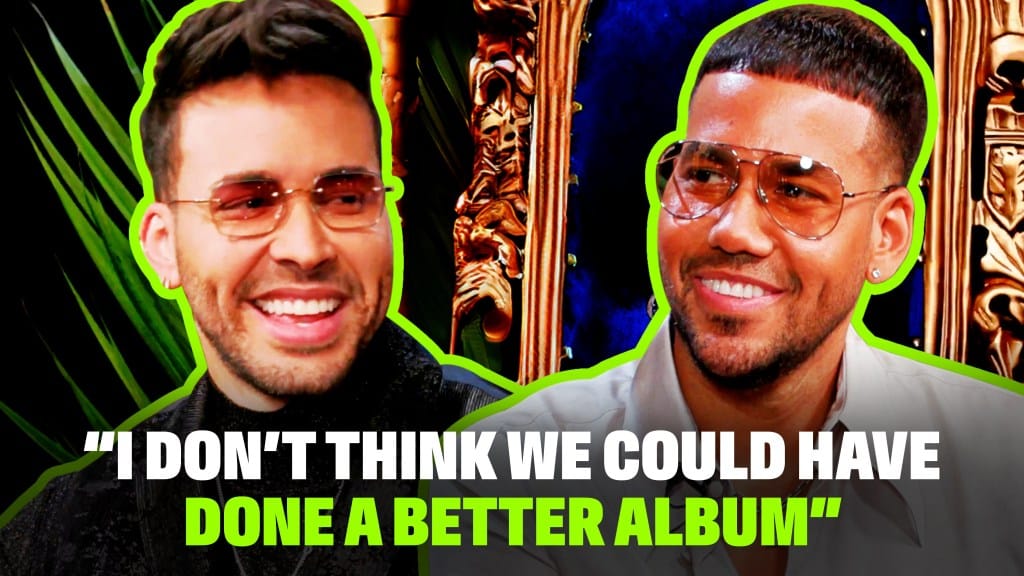
Trending on Billboard
Romeo Santos and Prince Royce join forces on a joint album titled ‘Better Late Than Never,’ and Billboard has the exclusive interview where they break their silence about their secret collaboration as Batman and Robin, sharing the magic behind their new and unexpected bachata album.
Romeo Santos:
The album is titled ‘Better Late Than Never,’ which means “better late than never.” The explanation seems obvious. Many people will likely say, “Why did you take so long?” The answer is simple: better late than never. We also wanted a song that would pay tribute to the title. That’s why there’s a song that’s literally called “Better Late Than Never,” which is a little more about love, heartbreak. A man who makes the mistake of not valuing his partner and when he sees her happy with someone else, and you see that things perhaps got damaged, he recognizes that he lost his great love, but that he asks her to give him one last chance, that he’s changed now.
Prince Royce:
He changed.
And that it took too long for the change, but better late than never.
Prince Royce:
I think that’s a very deep, deep meaning, you know I think it’s growth, I think it’s perseverance. And to tie to everything that we were talking about. So, I think that’s a very deep concept and title in general.
Yeah, no, I think the title couldn’t have been a better title, you know it’s like, better late than Never, you know. You have any negative thing to say about “why did we take so long?” Better late than never! You know? “Why an album?” Why not? Better late than never.
The first song we recorded for the album, with the album in mind already, was “Mi Plan.” I think it was in St. Barts. We were there, chilling. We were actually just chilling, actually. We were like: “Let’s go record”.
It’s like a fellas trip.
And that’s where that idea started, already with this concept in mind that maybe a production was coming.
Keep watching for more!
Source: Kevin Mazur / Black Promoters Collective
Max B didn’t take long to get back in his duffel.
Less than a month after becoming a free man, Max is already giving fans new music. The Wave God stood tall through 16 years in prison and came home instantly, winning and being greeted with overwhelming love from friends, family, and fans. Usually, when artists are released from jail, they take time to readjust before dropping new music. But Biggaveli came out the gate swinging with his new track, “No More Tricks.” He even shouts out past and present legends in the opening line:
“MC Ren, Eazy-E, Dr. Dre feed the beast, Swizz my n*gga, Alicia Keys. That’s word to ‘Pac a million and one, milli three degrees.”
Fans online are going crazy, claiming that the Wave is back.
Before dropping “No More Tricks,” The Silver Surfer was spotted in the studio with his right-hand man, French Montana. Fresh out of prison, Max came out celebrating life. He had a star-studded welcome-home dinner with guests including Central Cee, Fivio Foreign, Jay Critch, and more.
Dave East even pulled up to welcome the Wave back home, despite his close alliance with Jim Jones. Rumors then started circulating that East had been kicked off the podcast he co-hosts with Capo, but that was quickly shut down, the Harlem rapper called cap:
“I never was around Max, but we had our own relationship through who he know. Me being around Jim (Jones) as long as I been around him and Jim being around my mom and my kids, I gotta holla at Capo and ask him, Yo bro how do you feel about that? Cause I got invited directly. So I have to have a conversation with bro before I just pop up, and he gotta hear about it. That’s just me.”
With all eyes on Max, he hasn’t disappointed, and his fans get to eat off this new record.
Trending on Billboard
For touring professionals in the live music industry, healthcare has long been an elusive benefit. While local stagehands working in venues across the country have enjoyed employer-provided health insurance for decades through International Alliance of Theatrical Stage Employees (IATSE) contracts, their counterparts on the road — the audio engineers, lighting technicians, production coordinators, and other crew members who travel with touring shows — have been left to navigate the healthcare system on their own.
Now, IATSE is working to change that through an ambitious grassroots campaign to extend its National Benefit Fund to touring professionals, offering them access to the same healthcare and retirement benefits enjoyed by their venue-based colleagues.
Related
The disparity — what some stagehands call the tale of two crews — becomes starkly apparent when touring and local union members work side by side in the same venue.
“I’ll be in an arena for 20 plus hours working side by side with someone from the local IATSE, and we’re in the same situation, the same long hours, possibly a dangerous environment, yet they are covered,” says Ally Vatter, a production coordinator who has been touring for 21 years, currently with Nine Inch Nails. “They are insured. I pay out of pocket, but if I can’t afford that, then I won’t be insured.”
The consequences of this gap can be severe. In 2009, before the Affordable Care Act eliminated pre-existing condition exclusions, Vatter’s appendix burst while on tour. As an uninsurable 27-year-old, she was left with a $50,000 hospital bill and discharged from the hospital just a day and a half after surgery because she had no insurance. The artist she was working for organized an early crowdfunding effort that eventually paid off the debt, but the experience highlighted a systemic problem.
“We work so hard, and we work for millionaires, and we’re over here begging each other for help,” Vatter says, noting that crowdfunding campaigns for touring crew members facing medical crises remain common today.
Related
Nathan Honor, a sound engineer and member of IATSE Local 4 in Brooklyn and Local 100 on the East Coast, recalls his own pre-union touring days: “I broke my foot at one point and had to do an entire tour with a limp, with a bad foot, and never really dealt with it, and it had lasting repercussions.”
The irony, as Joseph Juntunen points out, is that a solution already exists. Juntunen, a special representative for IATSE who spent years touring with acts like Black 47 and Graham Parker before helping organize unions at Webster Hall and Brooklyn Steel, explains that the National Benefit Fund has been providing healthcare and retirement benefits to IATSE members across various entertainment sectors for decades.
“When an employer makes a contribution to that fund, that money belongs to the recipient. It belongs to the person that earns that money through their labor, and it goes with them wherever they go,” Juntunen says.
The fund currently serves the vast majority of IATSE’s more than 180,000 members who work in TV, film, Broadway, trade shows and venues. The touring initiative, which would extend access to an estimated 33,000 professionals working in the touring industry globally, is designed around the realities of touring work, which involves professionals potentially working for multiple employers throughout the year.
Related
Here’s how it would function: When an artist or management company agrees to participate, they make contributions to the National Benefit Fund on behalf of their touring crew members. These contributions then go into individual “cap accounts” that belong to the workers and accumulate across different tours and employers.
“If you do one tour for two months at the beginning of the year, that money goes into your cap account. If you do another tour three months later on the same plan, that money would go into that cap account,” Honor explains. “Every quarter, there is a qualifying period where you choose your level of coverage, and then money is deducted from that cap account to buy your health insurance.”
Critically, the money stays in the worker’s account even during gaps between tours. “Even if no employer makes a contribution for two years, that money stays in your cap account, and you can use it to buy health insurance,” Honor says.
The system offers flexible tiered coverage options, ranging from catastrophic coverage for younger, healthier workers to premium “Cadillac” plans for those with families or greater healthcare needs. Workers can also pay out of pocket to upgrade their coverage if their cap account contributions aren’t sufficient for their desired plan level.
Related
Healthcare is provided through Anthem Blue Cross Blue Shield, and the plan’s large membership base allows for competitive rates that individual touring professionals could never achieve on their own.
Unlike traditional union initiatives, the health plan is entirely voluntary — no employer or worker is mandated to participate. Instead, IATSE is building support through a grassroots campaign, encouraging touring professionals to have conversations with their employers about joining the program.
“The touring industry is very big and broad, but it’s also small in the way that there’s a big word-of-mouth system that happens,” Vatter says. “Word travels quickly.”
The campaign is targeting artists, managers and tour managers — the key decision makers who control touring budgets. A town hall for interested parties is planned, and committee members have been working to spread awareness across the industry.
“We’re not looking to start fights with the employers. We’re not looking to have adversarial relationships,” Juntunen emphasizes. “We’re looking to work together to build a more sustainable, healthy touring industry.”
Related
The ultimate vision is for healthcare contributions to become a standard line item in touring budgets, much like they already are for venue work. If major promoters like Live Nation or AEG were to adopt the program across their tours, it could rapidly become an industry standard.
“We think this is really an opportunity for artists and management to put their money where their mouth is and help the people who are making the show,” Honor says.
According to Juntunen, the response so far has been encouraging. “The conversation is expanding rapidly, and we are in active discussions with several teams right now for next year’s touring cycle,” he says.
For touring professionals who have spent their careers without the basic security that their venue-based counterparts take for granted, the initiative represents more than just healthcare — it’s recognition of their essential role in the industry.
“This is the first time that someone extended an olive branch to the touring industry and said, ‘Hey, we see you. We understand we’re working right there with you, and we really want to make sure that you guys are safe and covered and taking care of yourselves as well,’” Vatter says. “Because in the end, we have the same goal, right? It’s to get that show up and make it work.”
As Honor notes, touring is “a very high impact business” where veteran crew members often reach their 40s, 50s, and 60s with health problems they can’t afford to treat and no retirement savings. “Not a day goes by at work that you don’t meet somebody who’s been touring for 20, 30, 40 years, and they don’t have anything saved,” he says.
Trending on Billboard
Seven-time Super Bowl champion, entrepreneur and philanthropist Tom Brady and comedian and actor Druski have teamed with instant commerce platform Gopuff to support The Super Monday Off Coalition, a 501(c)(4) nonprofit organization lobbying to make the Monday after the Big Game a federal holiday.
Explore
See latest videos, charts and news
“Going into work the day after the big game? Hard pass,” said Brady in an announcement of the partnership with Gopuff and the coalition. “A massive number of employees unexpectedly call out of work the day after the Big Game, creating a huge headache for businesses across the country and a drag on our economy. That’s why I’m deepening my partnership with Gopuff to tackle this problem head-on.”
As part of the campaign launch, Brady and Druski — who, along with Kevin Hart and Kai Cenat, is producing and starring in a movie called Livestream from Hell — will serve as celebrity spokesman for the initiative, which sounds like the kind of cause the Trump administration could get behind. The duo will appear in a humorous television ad, titled “Hard Pass,” that will premiere during the Green Bay Packers vs. Detroit Lions Thanksgiving Day game, which will air on the Fox network.
The campaign will continue through television media buys and IRL activations throughout the remainder of the football season in an attempt to rally fans to suppor — and help fund — the coalition.
“The Super Bowl brings every single American together,” Yakir Gola, co-founder and co-CEO of Gopuff in the announcement. “That’s why the Monday after the Super Bowl must become Super Monday – an official federal holiday that honors our love for competition, victory, and the greatest country on Earth. By supporting The Super Monday Off Coalition, we’re putting real action behind a cultural truth.”
The announcement cites the 2025 results of a longstanding Harris Poll which indicate that 43% of employed Americans believe the Monday after the Big Game should be a national holiday — up from 37% in 2024 — and estimated that 22.6 million employed Americans planned to miss work the day after last February’s Super Bowl LIX between the Kansas City Chiefs and Philadelphia Eagles.
In 2018, HR consulting firm Challenger, Gray and Christmas estimated that the impact on American businesses is approximately $3 billion in lost economic activity. The Super Monday Off announcement claims that “planned, national holiday replaces disruption with predictability, giving employers, employees, and families the ability to plan ahead.”
To help support the cause, Gopuff will donate 1% of profits to the coalition — not to exceed $25,000 a week — from a collection game-friendly Super Monday Off collection of drinks and snacks through Feb 8, 2026 (the date of next year’s Super Bowl). Customers will also have the ability to donate to the nonprofit via their cart.
To learn more about The Super Monday Off Coalition 501(c)(4) and how you can support the effort, visit SuperMondayOff.com.
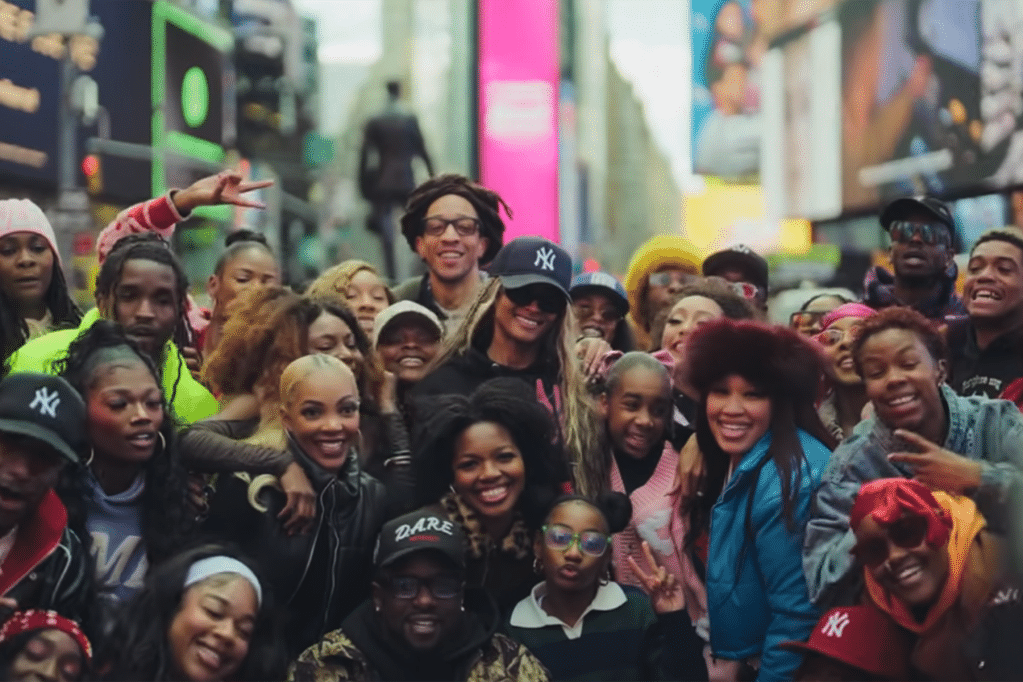
Trending on Billboard
Ciara has obviously adjusted well to her newest home sweet home.
In an epic new video, which Billboard is premiering exclusively below, Ciara takes to the streets of New York City for a 40-dancer Times Square flash mob celebrating her latest single “Nice n’ Sweet.” In addition to the CiCi deluxe track, which features Afropop artists MOLIY and Oxlade, the dancers also get down to “BRB” and the TikTok-viral “Low” in the “NYC Takeover” video, filmed on Nov. 17 during the early morning commute.
“I just knew being in the streets of New York dancing to ‘Low’ and ‘Nice n’ Sweet,’ which are very New York-ish, there’s an Afro-Caribbean influence in it — we know New York breeds that kind of energy throughout the streets,” Ciara told Billboard‘s Delisa Shannon. “So it just felt like the perfect place to have this moment and another ‘this place feels like home’ moment for me, which I loved.”
Alongside her NFL quarterback husband Russell Wilson and their four children, Ciara relocated to NYC ahead of the current football season, when Russ got picked up by the New York Giants.
“Everyone knows I’m from Atlanta, but at the same time, New York is showing our family tremendous love,” Ciara tells Billboard. “And as an artist, I feel like New York has put their arms around me too. And so this is another place that I call home. There’s just something so magical about being in the streets of New York. So I’ve never done a flash mob before. There was years ago where my team had put together a flash mob to celebrate me, but I never had done it where I just pop out in the middle of the streets and start dancing.”
The video begins with a small group of dancers taking turns in the center of a high-energy dance circle, set to “BRB” from the August album CiCi, before Ciara joins the chat in a Yankees ball cap, black sunglasses and blond braids past her waist for “Low,” featuring Diamond Platnumz.
The CiCi deluxe standout has been having a moment on TikTok, thanks to the “Low” Dance Challenge, and Ciara is grateful for the way the platform is spreading her music worldwide.
“The digital footprint has allowed for even more global expansion, you know?” Ciara tells Billboard. “And you get to see the influence of technology, where everyone and their mama can join in on the dance. And guess what? Everyone gets to see people shine in their own living rooms, right? I think there’s some kind of sense of ownership that people have, or a sense of empowerment when their videos go viral. And if we didn’t have these digital platforms, that opportunity wouldn’t exist. So I’ve learned to appreciate those moments and the power of those moments.”
Finally, the Nov. 14-released “Nice n’ Sweet” has its big moment, with Ciara joining the squad for some group choreography set to the Caribbean-influenced single. The star took the opportunity to take pics with all the dancers before hopping in her car and saying of the dance moment: “That was nice and sweet!”
Watch the video below, exclusively on Billboard.
–Reporting by Delisa Shannon
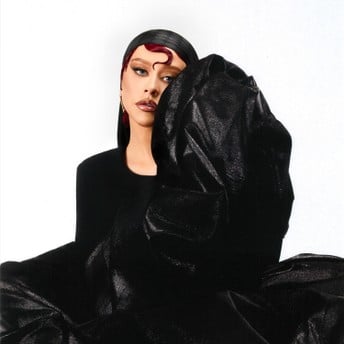
Trending on Billboard Christina Aguilera counts down a few of her favorite things in the latest teaser video for the singer’s upcoming international holiday spectacular. “‘My Favorite Things‘ — the first single from my upcoming Christmas special, recorded live from the Eiffel Tower — arrives tomorrow,” Xtina wrote on Monday (Nov. 24) of the first […]
Trending on Billboard
Berklee College of Music is announcing the recipient of the inaugural Nat King Cole and Natalie Cole Scholarship: Paris Pineyro. The $75,000 scholarship — a joint presentation from the Natalie Cole Foundation and Nat King Cole Generation of Hope — was established to commemorate the 75th anniversary of Natalie Cole’s birth this year as well as celebrate the trailblazing and enduring legacies of pianist/singer Cole and his singer-songwriter daughter.
Explore
See latest videos, charts and news
In a joint statement given to Billboard, twin sisters Casey Cole and Timolin Cole-Augustus, said, “Our father and sister were known for their vocal abilities and emotional delivery, even with dad often insisting he was a pianist first and foremost. Their dedication to their vocal craft is one of the reasons we’re so happy that Paris is the inaugural recipient of the Nat King Cole and Natalie Cole Scholarship. Paris is a talented singer and an exemplary student, and we’re honored to connect our family’s legacy to a voice of the future through this scholarship with Berklee College of Music.”
Pineyro, a sophomore at Berklee who goes by the artist name Paris Dior, is studying music business/management and performance. In the Berklee press announcement, Pineyro commented, “It’s more than recognition — it reflects every late night, every struggle and every moment I pushed through my doubts. It reminds me that even when the path feels impossible, perseverance can lead to something truly ‘unforgettable,’ to quote the iconic Nat King Cole and Natalie Cole. I wish to express my sincere appreciation for being selected as the first recipient of this scholarship. It was an unexpected honor that fills me with deep gratitude. I am so grateful to the Natalie Cole Foundation and Nat King Cole Generation Hope for believing in my potential and investing in my journey.”
A jazz and pop vocalist as well as a pianist, Nat King Cole is known for standards such as “Mona Lisa,” “Nature Boy” and holiday classic “The Christmas Song.” Daughter Natalie won nine Grammys during her career — including best new artist. Her repertoire includes “This Will Be,” “I’ve Got Love on My Mind” and “Unforgettable,” a 1991 duet with her late father that reprised his own 1951 hit. Natalie was also awarded an honorary doctorate from Berklee College of Music in 1995.
“It is an absolute privilege to be part of the first ever Nat King Cole and Natalie Cole Scholarship, honoring the legacy of two of the most inspirational artists of all time,” said Phil Lima, assistant chair of the Voice department at Berklee, in a statement provided to Billboard. “It is fitting for Paris to become the inaugural recipient of this award as she has already inspired so many of her instructors and peers in our community through her impressive abilities and instincts as a creator, and her generous and affirming nature as a collaborator and supporter. The scholarship opens more doors for Paris to advance her education and her career. We are excited for many more young Berklee musicians to have the same opportunity in the years to come.”
Find more information about Berklee scholarships here.

 State Champ Radio
State Champ Radio 